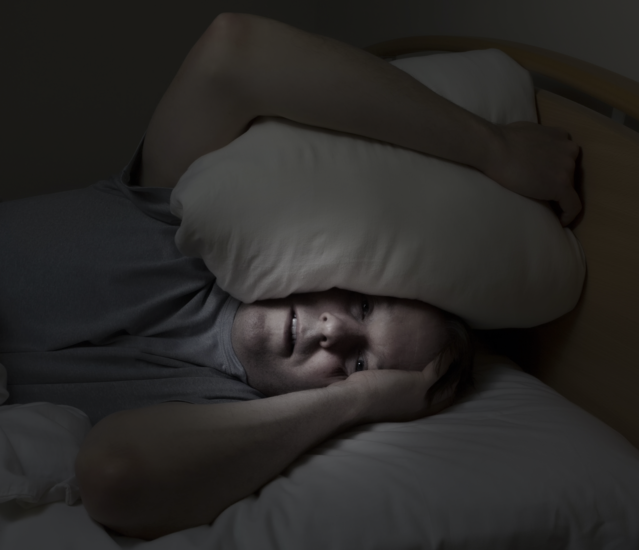Sleep
Sleep, Mind, and Microbes
3 simple approaches for getting better sleep and balanced mood
Posted September 23, 2022 Reviewed by Hara Estroff Marano
Key points
- More than 97 percent of American adults report mild to moderate sleep-quality problems.
- Seventy-five percent of depressed individuals experience significant insomnia.
- Sleep, the health of the gut microbiome , and mood are interdependent.
- Simple improvements in sleep hygiene and gut health can increase sleep quality and mental wellness.
By Nicole Cain, ND, MA
More than 40 million Americans suffer from chronic sleep disorders with another 20 million reporting occasional sleep problems.1 Stress and anxiety are well known to negatively affect sleep quality, while, conversely, poor sleep quality can also result in increased anxiety and depression. It is a vicious cycle exacerbated by the external stressors we have all recently endured.

According to the American Psychological Association’s 2022 Stress in America Survey,2 87% of us feel as though there has been a constant stream of crises over the last two years. And there is no doubt that health, economic, and political pressures have taken their toll on our sleeping patterns, with more than 97% of adults surveyed reporting mild to moderate sleep quality problems.3
Sleep-Mood Interdependence
Poor sleep quality has been associated with a number of cognitive4,5 and mental health symptoms, including anxiety and depression.6 Research suggests that there is an interrelationship between sleep and the microbes in the gut. In 2021, Sleep Medicine reported that an imbalance in the gut microbiome, called dysbiosis, can interfere with sleep and vice versa.7
In a 2019 study,8 investigators examined the gut microbiome and sleep efficiency over a period of one month. Their findings suggest that both greater microbial diversity, specifically the presence of Bacteroidetes and Firmicutes species, promoted healthier sleep including greater total sleep time. They also found that high levels of the inflammatory marker IL-6 is associated with poor sleep quality, a finding that has been reported previously.
Another 2021 study,in Pharmacological Research, suggested a relationship between dysbiosis, negative changes in the gut-brain barrier, and increased disorders of sleep. Authors recommended probiotic nutrition as an approach for improving cognitive health, mood, and sleep.9
Related research further emphasizes the correlation between sleep quality and mental well-being, with a reported 75% of individuals suffering from depression experiencing insomnia.6 Those experiencing both mood and anxiety disorders are much more likely to experience severe rates of sleep deprivation.10

Although the relationship between sleep and the gut microbiome is a relatively recent area of study, numerous findings link microbial diversity and immune function with sleep quality and duration. Those findings provide an avenue for therapeutic interventions to improve mood, sleep, and overall health.
3 Approaches to Improve Your Sleep Hygiene and Mental Well-being11
1. Develop a Sleep-Supportive Routine12
Healthy habits can make all the difference in optimizing your circadian rhythm and sleep cycle. These are simple and effective first steps:
-
Follow a consistent sleep-wake schedule.
-
Exercise daily.
-
Get natural sunshine whenever possible.
-
Refrain from caffeine late in the day and alcohol before bed.
-
Limit screen time and blue light exposure before bed.
-
Sleep in a dark, cool (65-70℉) room.
2. Support Gut Microbiome Diversity and Gut-Brain Nourishment
A produce-rich diet and/or inclusion of a quality probiotic can improve and diversify the gut microbial population, strengthen the junction between intestinal cells, decrease toxin load—including bacterial toxins and lipopolysaccharides (LPS)—and blunt excessive inflammation by modulating pro-inflammatory cytokines such as IL-6.13 Do homework to ensure the probiotic formulation you select has the optimal strains and the real-world clinical research to defend its gut-brain support claims.14
You might also consider evidence-based, gut-brain–active, sleep-supportive supplements15 including:
-
Inositol: shown to enhance cognitive function, reduce anxious thoughts, and increase the relaxing neurotransmitter GABA
-
L-Theanine: effective in blocking excitatory glutamate neurotransmitter activity, increasing relaxing GABA, and reducing racing thoughts
-
Glycine: demonstrated to reduce anxiety, stabilize blood sugar, and improve sleep quality
-
Taurine: modulates GABA and supports brain and heart health, shown to improve sleep quality and reduce anxiety and stress
-
Phosphatidylserine: reduces the stress hormone cortisol, improves cognition, reduces anxiety, and enhances sleep quality.

3. Investigate Cognitive Behavioral Therapy for Insomnia (CBT-I)16,17
Cognitive behavioral therapy is a structured program commonly recommended as a first-line treatment for chronic insomnia. Treatment regimens typically range from two to eight sessions ; they combine cognitive aspects to address attitudes and thoughts on sleep, behavioral interventions including relaxation techniques, and psychoeducational interventions addressing the connection between thoughts, feelings, and behaviors toward sleep.
CBT-I has been shown to provide benefits for up to 80% of participants with improvements including faster time to sleep, more time asleep, and less sleep interruption—with results frequently maintained over time.
Final Thoughts
The relationship between the gut microbiome and sleep quality is an emerging field of study that continues to illuminate the interdependence of gut health, sleep, and mood and the mechanisms underlying that interdependence.. Findings to date strongly suggest that taking simple steps to heal the gut and improve sleep hygiene can significantly improve mood and mental wellness.
References
1. National Institutes of Health as reported by the Anxiety and Depression Association of America. https://adaa.org/understanding-anxiety/related-illnesses/sleep-disorders
2. American Psychological Association (2022), https://www.apa.org/news/press/releases/stress/2022/infographics-march.
3. John, B., Marath, U., Valappil, S.P. et al. Sleep Pattern Changes and the Level of Fatigue Reported in a Community Sample of Adults During COVID-19 Pandemic. Sleep Vigilance(2022). https://doi.org/10.1007/s41782-022-00210-7
4. Lo JC, Groeger JA, Cheng GH, Dijk D-J, Chee MW. Self-reported sleep duration and cognitive perfor- mance in older adults: a systematic review and meta-analysis. Sleep Med. 2016; 17:87–98. https://doi. org/10.1016/j.sleep.2015.08.021 PMID: 26847980
5. Gobin CM, Banks JB, Fins AI, Tartar JL. Poor sleep quality is associated with a negative cognitive bias and decreased sustained attention. J Sleep Res. 2015; 24(5):535–42. https://doi.org/10.1111/jsr.12302 PMID: 25913483
6. Nutt D, Wilson S, Paterson L. Sleep disorders as core symptoms of depression. Dialogues Clin Neurosci. 2008;10(3):329-36. doi: 10.31887/DCNS.2008.10.3/dnutt. PMID: 18979946; PMCID: PMC3181883.
7. Neroni B, Evangelisti M, Radocchia G, Di Nardo G, Pantanella F, Villa MP, Schippa S. Relationship between sleep disorders and gut dysbiosis: what affects what? Sleep Med. 2021 Nov;87:1-7. doi: 10.1016/j.sleep.2021.08.003. Epub 2021 Aug 18. PMID: 34479058.
8. Hong S, Mills PJ, Loredo JS, Adler KA, Dimsdale JE. The association between interleukin-6, sleep, and demographic characteristics. Brain Behav Immun. 2005 Mar;19(2):165-72. doi: 10.1016/j.bbi.2004.07.008. PMID: 15664789.
9. Koszewicz M, et al, Dysbiosis is one of the risk factor for stroke and cognitive impairment and potential target for treatment. Pharmacol Res. 2021 Feb;164:105277. doi: 10.1016/j.phrs.2020.105277. Epub 2020 Nov 7. PMID: 33166735.
10. Soehner AM, Harvey AG. Prevalence and functional consequences of severe insomnia symptoms in mood and anxiety disorders: results from a nationally representative sample. Sleep. 2012 Oct 1;35(10):1367-75. doi: 10.5665/sleep.2116. PMID: 23024435; PMCID: PMC3443763.
11. Suni, E., Mental Health and Sleep, https://www.sleepfoundation.org/mental-health, April 2022.
12. Breus, M., Sleep Hygiene, https://thesleepdoctor.com/sleep-hygiene/, September 2022.
13. Cristofori F, et al, Anti-Inflammatory and Immunomodulatory Effects of Probiotics in Gut Inflammation: A Door to the Body. Front Immunol. 2021 Feb 26;12:578386. doi: 10.3389/fimmu.2021.578386. PMID: 33717063; PMCID: PMC7953067.
14. Clinical Research. https://www.omnibioticlife.com/research-education/gut-brain-axis/
15. Cain, N. Synergistic Sleep Support: The Whole Shebang, https://drnicolecain.com/synergistic-sleep-support-the-whole-shebang/.
16. Trauer JM, et al. Cognitive Behavioral Therapy for Chronic Insomnia: A Systematic Review and Meta-analysis. Ann Intern Med. 2015 Aug 4;163(3):191-204. doi: 10.7326/M14-2841. PMID: 26054060.
17. Freeman D, et al., The effects of improving sleep on mental health (OASIS): a randomised controlled trial with mediation analysis. Lancet Psychiatry. 2017 Oct;4(10):749-758. doi: 10.1016/S2215-0366(17)30328-0. Epub 2017 Sep 6. PMID: 28888927; PMCID: PMC5614772.




